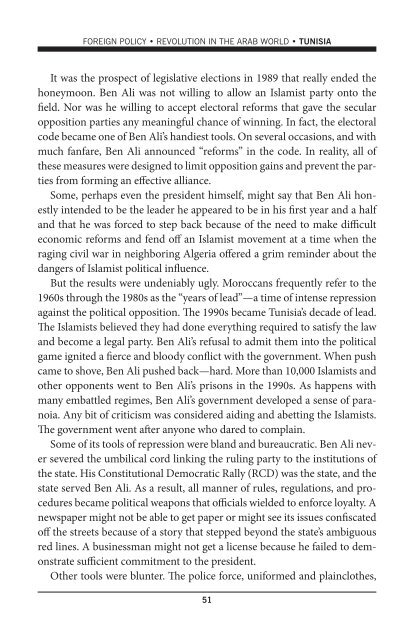Revolution in the Arab World - Observation of a lost soul Blog
Revolution in the Arab World - Observation of a lost soul Blog
Revolution in the Arab World - Observation of a lost soul Blog
Create successful ePaper yourself
Turn your PDF publications into a flip-book with our unique Google optimized e-Paper software.
foreign policy • revolution <strong>in</strong> <strong>the</strong> arab world • TUnisia<br />
It was <strong>the</strong> prospect <strong>of</strong> legislative elections <strong>in</strong> 1989 that really ended <strong>the</strong><br />
honeymoon. Ben Ali was not will<strong>in</strong>g to allow an Islamist party onto <strong>the</strong><br />
field. Nor was he will<strong>in</strong>g to accept electoral reforms that gave <strong>the</strong> secular<br />
opposition parties any mean<strong>in</strong>gful chance <strong>of</strong> w<strong>in</strong>n<strong>in</strong>g. In fact, <strong>the</strong> electoral<br />
code became one <strong>of</strong> Ben Ali’s handiest tools. On several occasions, and with<br />
much fanfare, Ben Ali announced “reforms” <strong>in</strong> <strong>the</strong> code. In reality, all <strong>of</strong><br />
<strong>the</strong>se measures were designed to limit opposition ga<strong>in</strong>s and prevent <strong>the</strong> parties<br />
from form<strong>in</strong>g an effective alliance.<br />
Some, perhaps even <strong>the</strong> president himself, might say that Ben Ali honestly<br />
<strong>in</strong>tended to be <strong>the</strong> leader he appeared to be <strong>in</strong> his first year and a half<br />
and that he was forced to step back because <strong>of</strong> <strong>the</strong> need to make difficult<br />
economic reforms and fend <strong>of</strong>f an Islamist movement at a time when <strong>the</strong><br />
rag<strong>in</strong>g civil war <strong>in</strong> neighbor<strong>in</strong>g Algeria <strong>of</strong>fered a grim rem<strong>in</strong>der about <strong>the</strong><br />
dangers <strong>of</strong> Islamist political <strong>in</strong>fluence.<br />
But <strong>the</strong> results were undeniably ugly. Moroccans frequently refer to <strong>the</strong><br />
1960s through <strong>the</strong> 1980s as <strong>the</strong> “years <strong>of</strong> lead”—a time <strong>of</strong> <strong>in</strong>tense repression<br />
aga<strong>in</strong>st <strong>the</strong> political opposition. The 1990s became Tunisia’s decade <strong>of</strong> lead.<br />
The Islamists believed <strong>the</strong>y had done everyth<strong>in</strong>g required to satisfy <strong>the</strong> law<br />
and become a legal party. Ben Ali’s refusal to admit <strong>the</strong>m <strong>in</strong>to <strong>the</strong> political<br />
game ignited a fierce and bloody conflict with <strong>the</strong> government. When push<br />
came to shove, Ben Ali pushed back—hard. More than 10,000 Islamists and<br />
o<strong>the</strong>r opponents went to Ben Ali’s prisons <strong>in</strong> <strong>the</strong> 1990s. As happens with<br />
many embattled regimes, Ben Ali’s government developed a sense <strong>of</strong> paranoia.<br />
Any bit <strong>of</strong> criticism was considered aid<strong>in</strong>g and abett<strong>in</strong>g <strong>the</strong> Islamists.<br />
The government went after anyone who dared to compla<strong>in</strong>.<br />
Some <strong>of</strong> its tools <strong>of</strong> repression were bland and bureaucratic. Ben Ali never<br />
severed <strong>the</strong> umbilical cord l<strong>in</strong>k<strong>in</strong>g <strong>the</strong> rul<strong>in</strong>g party to <strong>the</strong> <strong>in</strong>stitutions <strong>of</strong><br />
<strong>the</strong> state. His Constitutional Democratic Rally (RCD) was <strong>the</strong> state, and <strong>the</strong><br />
state served Ben Ali. As a result, all manner <strong>of</strong> rules, regulations, and procedures<br />
became political weapons that <strong>of</strong>ficials wielded to enforce loyalty. A<br />
newspaper might not be able to get paper or might see its issues confiscated<br />
<strong>of</strong>f <strong>the</strong> streets because <strong>of</strong> a story that stepped beyond <strong>the</strong> state’s ambiguous<br />
red l<strong>in</strong>es. A bus<strong>in</strong>essman might not get a license because he failed to demonstrate<br />
sufficient commitment to <strong>the</strong> president.<br />
O<strong>the</strong>r tools were blunter. The police force, uniformed and pla<strong>in</strong>clo<strong>the</strong>s,<br />
51




